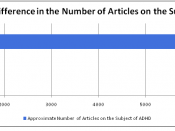Part I: Presentation and Development of the Controversial Issue
Medication has been one of the greatest tools for the health care and psychological field to help treat mental patients with their psychological abnormalities. However, over the past decade, mental health professionals and researchers have seen an increase in the number of prescriptions given to patients in the United States, especially to children. With that in mind, do we or don't we overmedicate mental patients in the United States?
Position A
Researchers, such as, Dr. Julie Zito are alarmed by the growing statistical and computerized data increase of over medication to mental patients in the United States, especially children with Attention-Deficit/Hyperactivity Disorder (ADHD). According to Dr. Julie Zito's research, the number of children using medication to control behavior in the 1990's have grew to nearly the number of adults using these drugs. In addition, from 1987 to 1996, psychiatric drug prescriptions tripled in children and young adults (up to age 20) who were patients in HMO's in the Midwest.
Moreover, about 6 percent of the nearly 900,000 children studied had prescriptions for psychiatric medication such as Ritalin and other stimulants which were prescribed most often, with antidepressants second, and mood stabilizers third (2003).
With this information in mind, the consequences of children been overmedicated can lead to serious side effects. Repercussions from over medicating children can have physiological effects such as: poor appetite, insomnia, irritability, headaches, stomachaches, and so on (Harrison). In addition, some children develop a physical dependence on the medication that can possibly lead to substance abuse with this and other drugs in the future. One of the worse side affects of all is that overmedicating takes away from a child's spontaneity or "spark" and they progressively act like robots.
Position B
In contrast to research that suggests over...


